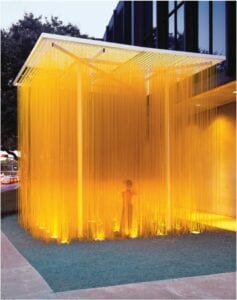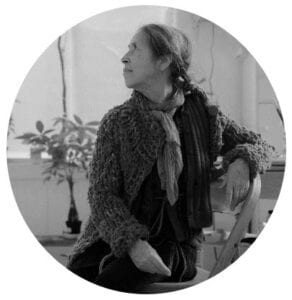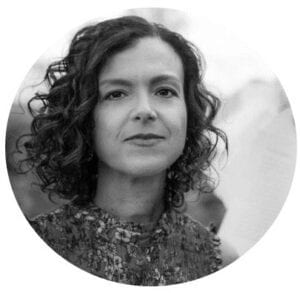 Penetrable · Jesús Rafael Soto · 1990
Penetrable · Jesús Rafael Soto · 1990
Paint, metal and PVC strands · 200 x 200 x 200″ (508 x 508 x 508 cm)
Patricia Phelps de Cisneros Collection · © Jesús R. Soto/ADAGP – Paris, 2022.
|
CECILIA VICUÑA Agua en tres tiempos. Agua selval. Quipu sonoro Fibra y fibrilla El sueño El labio ¿Quién penetra
Con Agüitas de pulso
Cuatrocientos Los gritos Chasqui El dedo El ojo Pelos mensajeros Las illas Vibrá Lo eterno Vivo Alterno y pen etro Fibrás amarillas A la huasca su despertar Pene Ssssuuuuu despertar. |
Translated by ROSA ALCALÁ Water in three tenses. Jungle water. Sonorous quipu Fiber and fibril The dream The lip Who penetrates
Concert Little waters pulsating
400 Scream, scream Dream’s The finger The eye Of hair? Gods shi, shimmering What’s hidden Eternity What’s dead What’s grounded penetrating Yellow, yellow, yellow fibers Lashed awake By dream’s Its Lash awake, |
Cecilia Vicuña es poetisa, artista, activista y cineasta, cuyo trabajo se dirige a preocupaciones urgentes del mundo moderno, incluyendo la destrucción ecológica, derechos humanos y la homogeneización cultural. Nacida y criada en Santiago de Chile, ha estado en el exilio desde principios de 1970, después del golpe de estado militar contra el presidente Salvador Allende. A mediados de 1960, empezó a crear instalaciones performáticas temporales que desaparecen y quipus, rescatando tradiciones ancestrales para crear nuevas metáforas. Obras a las que llama, “Arte Precario” una nueva categoría independiente para su arte. Su trabajo se ha incluido en la 59th Venice Biennale, donde recibió el Golden Lion Award, 2022; y en documenta 14, Athenas y Kassel, 2017. Ha tenido una exhibición personal de su obra en el Guggenheim Museum, 2022. Vicuña es autora de 25 libros de arte y poesía. Es cofundadora de oysi.org, organización educacional y sin fines de lucro dedicada a la tradición oral indígena. Vive y trabaja entre Nueva York y Chile.
Cecilia Vicuña is a poet, artist, activist and filmmaker whose work addresses pressing concerns of the modern world, including ecological destruction, human rights, and cultural homogenization. Born and raised in Santiago de Chile, she has been in exile since the early 1970s, after the military coup against president Salvador Allende. In the mid-1960s, she began creating impermanent performative installations that disappear and quipus, recovering ancient traditions to create new metaphors. She named these works “Arte Precario”, as a new independent and non- colonized category for her art. Her work has been included in the 59 th Venice Biennale, where she received the Golden Lion Award, 2022; and in documenta 14, Athens and Kassel, 2017. A solo exhibition of her work has been organized at the Guggenheim Museum, 2022. Vicuña has authored over 25 art and poetry books. She is the co-founder of oysi.org, a nonprofit educational organization dedicated to indigenous oral tradition. She lives and works between New York City and Santiago de Chile.
Foto por/by William Jess Laird
Rosa Alcalá es autora de tres libros de poesía, el más reciente, MyOTHER TONGUE (Futurepoem, 2017). Sus poemas aparecen en numerosas antologías y publicaciones, incluyendo Best American Poetry 2019, American Poets in the 21st Century: Poetics of Social Engagement, The Nation, y American Poetry Review. Recibió la National Endowment for the Arts Translation Fellowship, y fue finalista del PEN Translation Award. Es editora y co- traductora de New & Selected Poems of Cecilia Vicuña (Kelsey Street Press, 2018), así como profesora de escritura creativa en la Universidad de Texas en El Paso, donde da clases en el MFA bilingüe.
Rosa Alcalá is the author of three books of poetry, most recently MyOTHER TONGUE (Futurepoem, 2017). Her poems appear in Best American Poetry 2019, American Poets in the 21st Century: Poetics of Social Engagement, The Nation, and American Poetry Review. The recipient of a National Endowment for the Arts Translation Fellowship, and runner- up for a PEN Translation Award, she is the editor and co-translator of New & Selected Poems of Cecilia Vicuña (Kelsey Street Press, 2018). She is professor of creative writing at the University of Texas at El Paso, where she teaches in its Bilingual MFA Program.
Foto por /by Margarita Mejía

